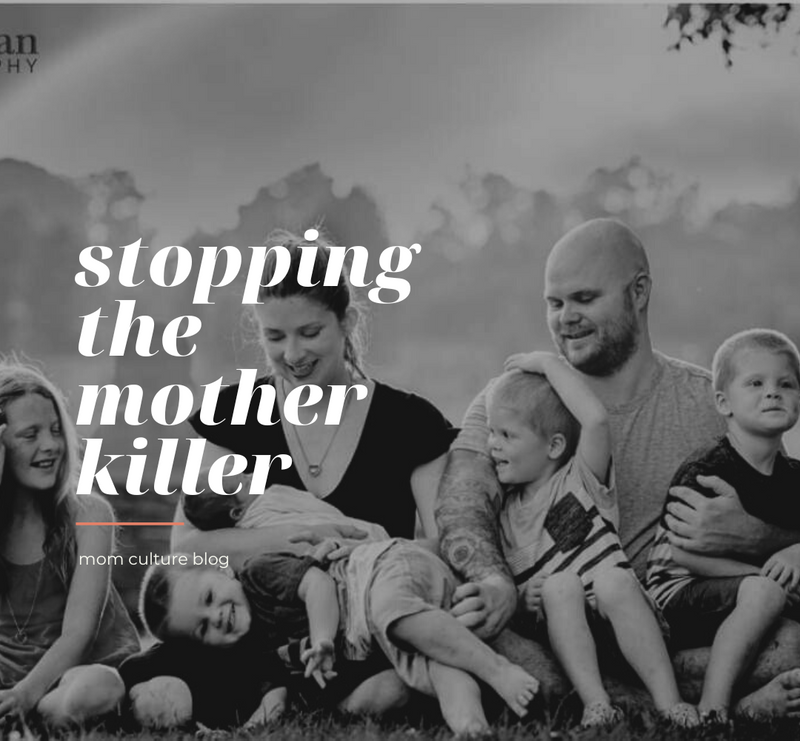
Trigger warning
This blog post contains struggles with Postpartum Depression, Anxiety and Psychosis. This material may be hard for some to read.
"I want to share my final English paper for this semester. My English Professor has encouraged me to do so.
If you have the desire to share, please do so." -Morgen Julie Noel Story
I almost died.
It was three days before my thirty-second birthday. I couldn’t hear myself think anymore. Someone else had taken over completely. I had been fighting the takeover for months. I was on my own, struggling to parent five young children while my husband was far away from home with the military. The sound of my children’s voices were like nails on a chalkboard. I didn’t have the energy or motivation to cook, clean, shower, or even get dressed anymore. I was barely managing to stay alive. My only happy thought had become the thought of me dying. I did not know what was wrong with me. I just knew something was very wrong. In a moment of clarity, I reached out to my pastor, who immediately took me to the hospital where I spent sixteen days healing. I am one in seven. Postpartum depression, anxiety, and psychosis are the most common pregnancy complication and the leading cause of perinatal death (Kathleen Chin, Suicide and Maternal Mortality). With one in nineteen women choosing to end their lives (MGH Center for Women's Mental Health). Unfortunately, most women do not receive education on post-partum depression until after they are experiencing symptoms. Eighty percent of perinatal suicides are committed by women who have not been treated by a doctor. In order to save lives Post-Partum Depression should be taught as part of Sex Ed.
One in seven women is affected by PPD.
It is the most common complication of pregnancy and the leading killer of women during and after birth. Lindsay Admon, MD, MSc, an OB/GYN (obstetrics and gynecology) at Michigan Medicine Von Voigtlander Women’s Hospital, says that “suicide is one of the leading causes of maternal death.” (Leah Kuntz, Psychiatric Times). One out of every nineteen women struggles with PPD and chooses to end their life. When you think about the statistics, that means out of every seven mothers you personally know, at least one of them is struggling just to stay alive. Furthermore out of every nineteen of those mothers, there is a potential for one of them to lose the battle for their own life. Think about it, if you know one hundred and twenty mothers, twenty of those mothers have postpartum depression, and one of those twenty mothers will die or will harm their child(ren). These statistics cannot be ignored. While OB/GYN doctors are highly trained on how to notice and treat the symptoms, often they do not even mention PPD until after symptoms are already present. Many women miss the signs and do not seek medical help because they do not know what they are experiencing is a treatable illness. Luckily for me, my pastor’s wife had experienced it before, and when I went to the hospital, I was able to ask if that was what was going on with me.
There is a stigma that follows around PPD, preventing life-saving education from being spread.
Intentionally creating a space for PPD to be taught would eliminate that. Many women do not speak up about what they are experiencing because saying out loud that you do not feel like you love your baby/children or that you want to die, is such a dramatic and shocking thing to do. When I admitted out loud to my family that I no longer wanted to be alive, I was told to “get over it” and to “think happy thoughts”. So many women experience this same reaction when they desperately need help. I felt so ashamed to admit that I was detaching from life and could not handle the stress that I was under. My sister also experienced PPD, but in the form of psychosis, a much rarer form of PPD. After she was finally treated, she admitted that she had become afraid that she was going to harm her baby, rather than herself. She said she experienced intense moments of not being in her own body. She felt as though she was watching someone else take over and destroy her life. My sister and I have stories that are shared by mothers around the globe. Neither of us knew that such a thing was even possible, and neither did the tens of thousands of women who experienced it until after it had happened to them. This stigma causes many women to be blindsided by this unfortunate fact of pregnancy and birth.
In the state of Georgia, Sex Ed covers education on puberty, abstinence, safe sex practices, HIV and AIDs prevention, and sexual assault prevention, as it does in most other states.
While there is plenty of information on avoiding pregnancy, it would be valuable if there was more information on what happens if you become pregnant. Aside from having a child before you are ready, knowing the risk factors, such as postpartum depression would be beneficial. While women do need to be educated during pregnancy by their doctor, potential fathers knowing the risks and signs would be even more valuable. If it had not been for the people in my life who saw the signs and knew them from their own experiences, I would not have survived. My husband, unfortunately, did not know what was going on with me, and it caused much tension in our marriage, which made my symptoms even worse. If he had been educated during sex ed as a teen, he might have been able to help me even sooner, and I would not have had to suffer for nearly a year before I sought help. When we increase the education on postpartum depression, we will be able to treat more women with PPD before the illness becomes deadly. “Treating more women with PPD is key,” says Tiffany A. Moore Simas, MD, associate professor of obstetrics and gynecology at the University of Massachusetts Medical School in Worcester, Massachusetts.
My story is one of the millions of stories that start and end much the same way.
Unfortunately, there are families that have much darker stories than I do. Just recently a mother in Coney Island who was suffering from PPD drowned her three young children. She is not the first mother battling postpartum depression to do this. If her spouse and family had basic educational knowledge of postpartum depression, they may have been able to save those three beautiful children ages seven, four, and three months. Looking at things from that aspect, intentionally educating society during sex ed would not only save the lives of mothers but would also save the lives of their offspring.
I am lucky. I am one in seven, but I am not one in nineteen. I am not the mother who harmed her children. I am not the mother who ended her own life. I am the mother who survived, but I would not have been if those around me had not been educated on postpartum depression. Others can and will be saved if we can stop the mother killer by ending the lack of education on postpartum depression.
WORK CITED
Caffrey, Mary. “Obstetricians Are Well-Positioned to Diagnose, Treat Postpartum Depression, Speakers Say.” AJMC, AJMC, 19 Dec. 2020, https://www.ajmc.com/.../obstetricians-are-well....
Chin, Kathleen, et al. “Suicide and Maternal Mortality.” Current Psychiatry Reports, U.S. National Library of Medicine, Apr. 2022, https://www.ncbi.nlm.nih.gov/pmc/articles/PMC8976222/.
Duddridge, Natalie. “Sources: Investigators Believe Coney Island Mom Who May Have Drowned Her 3 Children Was Suffering from Postpartum Depression.” CBS News, CBS Interactive, 13 Sept. 2022, https://www.cbsnews.com/.../coney-island-mom-children.../.
“Georgia State Profile.” SIECUS, 21 May 2021, https://siecus.org/state_profile/georgia-state-profile/.
Kuntz, Leah. “Pregnancy and Postpartum Suicide Risk: The New Numbers.” Psychiatric Times, Psychiatric Times, 25 Nov. 2020, https://www.psychiatrictimes.com/.../pregnancy-and....
MGH Center for Women's Mental Health. “Perinatal Suicide: Highest Risk Occurs at 9 to 12 Months Postpartum.” MGH Center for Women's Mental Health, 21 Mar. 2019, https://womensmentalhealth.org/.../perinatal-suicide.../.
Follow her on Tiktok @m0rg3nst0ry
Mom’s Need This!




Comments